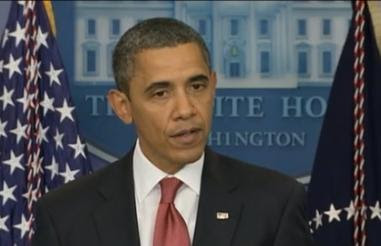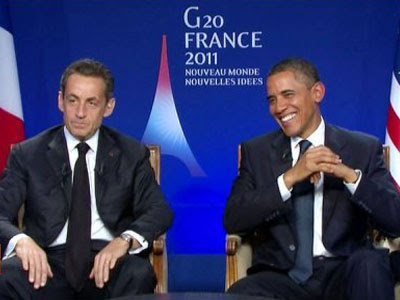 |
| Barack Obama, US President |
(Reuters) - The Obama administration will unveil a "more realistic" vision for the military on Thursday, with plans to cut tens of thousands of ground troops and invest more in air and sea power at a time of fiscal restraint, officials familiar with the plans said on Wednesday.
The strategic review of U.S. security interests will also emphasize an American presence in Asia, with less attention overall to Europe, Africa and Latin America alongside slower growth in the Pentagon's budget, the officials said.
Though specific budget cut and troop reduction figures are not set to be announced on Thursday, officials confirmed to Reuters they would amount to a 10-15 percent decline in Army and Marine Corps numbers over the next decade, translating to tens of thousands of troops.
The most profound shift in the strategic review is an acceptance that the United States, even with the world's largest military budget, cannot afford to maintain the ground troops to fight more than one major war at once. That is a move away from the "win-win" strategy that has dominated Pentagon funding decisions for decades.
The move to a "win-spoil" plan, allowing U.S. forces to fight one campaign and stop or block another conflict, includes a recognition that the White House would need to ramp up public support for further engagement and draw more heavily on reserve and national guard troops when required.
"As Libya showed, you don't necessarily have to have boots on the ground all the time," an official said, explaining the White House view.
"We are refining our strategy to something that is more realistic," the official added.
President Barack Obama will help launch the U.S. review at the Pentagon on Thursday, and is expected to emphasize that the size of the U.S. military budget has been growing and will continue to grow, but at a slower pace.
Obama has moved to curtail U.S. ground commitments overseas, ending the war in Iraq, drawing down troops in Afghanistan and ruling out anything but air power and intelligence support for rebels who overthrew Libyan leader Muammar Qaddafi.
The number of U.S. military personnel formally assigned to bases in Europe - including many now deployed in Afghanistan - is also set to decline sharply, administration sources said, while stressing that the final numbers have not been set.
'BASICALLY DISAPPEAR'
"When some army brigades start coming out of Afghanistan, they will basically disappear," one official said.
Many of the key U.S. military partners in the NATO alliance are also facing tough defense budget cuts as a result of fiscal strains gripping the European Union.
The president may face criticism from defense hawks in Congress, many of them opposition Republicans, who question his commitment to U.S. military strength.
Defense Secretary Leon Panetta and General Martin Dempsey, chairman of the military's Joint Chiefs of Staff, are set to hold a news conference to flesh out the contents of the review after Obama's remarks, which are also expected to stress the need to rein in spending at a time when U.S. budgets are tight.
White House spokesman Jay Carney said that the defense cuts stemming from an August debt ceiling deal - worth about $489 billion over 10 years - need to be enacted carefully.
"The president made clear to his team that we need to take a hard look at all of our defense spending to ensure that spending cuts are surgical and that our top priorities are met," Carney told reporters this week.
The military could be forced to cut another $600 billion in defense spending over 10 years unless Congress takes action to stop a second round of cuts mandated in the August accord.
Panetta spent much of Wednesday afternoon briefing key congressional leaders about the strategic review. Representative Adam Smith, the senior Democrat on the House of Representatives Armed Services Committee, said after speaking to Panetta that the review was an attempt to evaluate U.S. strategic priorities for the future rather than identify specific budget reductions.
Maintaining a significant presence in the Middle East and Asia, especially to counter Iran and North Korea, was a leading priority in the review, Smith said. So was making sure that military personnel are sufficiently cared for to guarantee the effectiveness of the all-volunteer force. Reductions in the size of U.S. forces in Europe and elsewhere are a real possibility, he said.
Pentagon spokesman Navy Captain John Kirby said with the military winding down a decade of war in Afghanistan and Iraq, it is appropriate to re-evaluate the role of U.S. forces abroad.
"From an operational perspective it's ... an opportune time to take a look at what the U.S. military is doing and what it should be doing or should be preparing itself to do over the next 10 to 15 years," he said on Wednesday.
"So, yes, the budget cuts are certainly a driver here, but so quite frankly are current events," Kirby said.
The strategic review of U.S. security interests will also emphasize an American presence in Asia, with less attention overall to Europe, Africa and Latin America alongside slower growth in the Pentagon's budget, the officials said.
Though specific budget cut and troop reduction figures are not set to be announced on Thursday, officials confirmed to Reuters they would amount to a 10-15 percent decline in Army and Marine Corps numbers over the next decade, translating to tens of thousands of troops.
The most profound shift in the strategic review is an acceptance that the United States, even with the world's largest military budget, cannot afford to maintain the ground troops to fight more than one major war at once. That is a move away from the "win-win" strategy that has dominated Pentagon funding decisions for decades.
The move to a "win-spoil" plan, allowing U.S. forces to fight one campaign and stop or block another conflict, includes a recognition that the White House would need to ramp up public support for further engagement and draw more heavily on reserve and national guard troops when required.
"As Libya showed, you don't necessarily have to have boots on the ground all the time," an official said, explaining the White House view.
"We are refining our strategy to something that is more realistic," the official added.
President Barack Obama will help launch the U.S. review at the Pentagon on Thursday, and is expected to emphasize that the size of the U.S. military budget has been growing and will continue to grow, but at a slower pace.
Obama has moved to curtail U.S. ground commitments overseas, ending the war in Iraq, drawing down troops in Afghanistan and ruling out anything but air power and intelligence support for rebels who overthrew Libyan leader Muammar Qaddafi.
The number of U.S. military personnel formally assigned to bases in Europe - including many now deployed in Afghanistan - is also set to decline sharply, administration sources said, while stressing that the final numbers have not been set.
'BASICALLY DISAPPEAR'
"When some army brigades start coming out of Afghanistan, they will basically disappear," one official said.
Many of the key U.S. military partners in the NATO alliance are also facing tough defense budget cuts as a result of fiscal strains gripping the European Union.
The president may face criticism from defense hawks in Congress, many of them opposition Republicans, who question his commitment to U.S. military strength.
Defense Secretary Leon Panetta and General Martin Dempsey, chairman of the military's Joint Chiefs of Staff, are set to hold a news conference to flesh out the contents of the review after Obama's remarks, which are also expected to stress the need to rein in spending at a time when U.S. budgets are tight.
White House spokesman Jay Carney said that the defense cuts stemming from an August debt ceiling deal - worth about $489 billion over 10 years - need to be enacted carefully.
"The president made clear to his team that we need to take a hard look at all of our defense spending to ensure that spending cuts are surgical and that our top priorities are met," Carney told reporters this week.
The military could be forced to cut another $600 billion in defense spending over 10 years unless Congress takes action to stop a second round of cuts mandated in the August accord.
Panetta spent much of Wednesday afternoon briefing key congressional leaders about the strategic review. Representative Adam Smith, the senior Democrat on the House of Representatives Armed Services Committee, said after speaking to Panetta that the review was an attempt to evaluate U.S. strategic priorities for the future rather than identify specific budget reductions.
Maintaining a significant presence in the Middle East and Asia, especially to counter Iran and North Korea, was a leading priority in the review, Smith said. So was making sure that military personnel are sufficiently cared for to guarantee the effectiveness of the all-volunteer force. Reductions in the size of U.S. forces in Europe and elsewhere are a real possibility, he said.
Pentagon spokesman Navy Captain John Kirby said with the military winding down a decade of war in Afghanistan and Iraq, it is appropriate to re-evaluate the role of U.S. forces abroad.
"From an operational perspective it's ... an opportune time to take a look at what the U.S. military is doing and what it should be doing or should be preparing itself to do over the next 10 to 15 years," he said on Wednesday.
"So, yes, the budget cuts are certainly a driver here, but so quite frankly are current events," Kirby said.
Read current news at http://bbc-cnn-worldnews.blogspot.com







